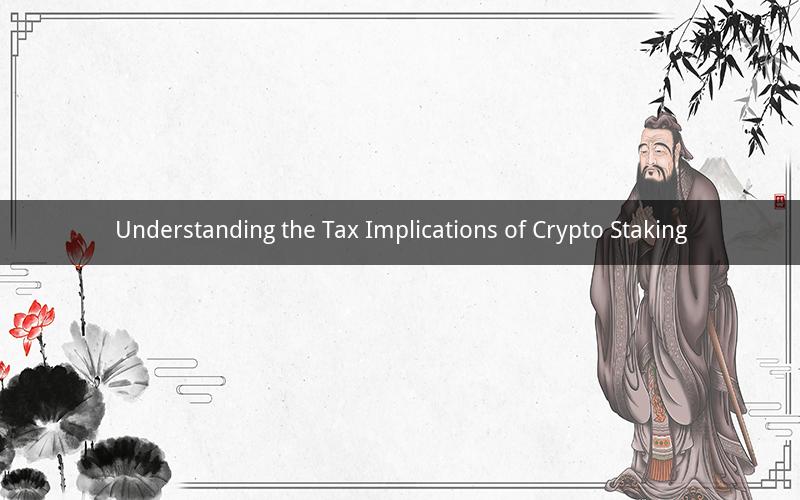
Introduction:
Crypto staking has emerged as a popular method for generating income in the cryptocurrency space. However, one question that often arises is whether crypto staking is taxable. In this article, we will delve into the topic and provide insights into the tax implications of crypto staking.
Is Crypto Staking Taxable?
1. The Taxability of Crypto Staking:
Crypto staking is generally considered taxable income in many jurisdictions. When you stake your cryptocurrency, you are essentially lending it to a platform or network in exchange for rewards. These rewards are generated through the network's consensus mechanism and are paid out in the form of additional cryptocurrency.
2. Tax Treatment:
The tax treatment of crypto staking rewards varies depending on the country or region. In some countries, such as the United States, crypto staking rewards are taxed as ordinary income. This means that you will need to report these rewards on your tax return and pay taxes on them at your marginal tax rate.
3. Reporting Crypto Staking Rewards:
To accurately report your crypto staking rewards, you will need to keep track of the following information:
- The amount of cryptocurrency staked
- The reward amount received
- The fair market value of the cryptocurrency at the time of receipt
- The date of receipt
4. Tax Implications for Different Jurisdictions:
a. United States:
In the United States, crypto staking rewards are taxed as ordinary income. You will need to report these rewards on Schedule 1 of your tax return and pay taxes on them at your marginal tax rate. Additionally, if you sell the cryptocurrency you received from staking, you will need to report the capital gain or loss on Schedule D.
b. Canada:
In Canada, crypto staking rewards are also taxed as ordinary income. You will need to report these rewards on your tax return and pay taxes on them at your marginal tax rate. If you sell the cryptocurrency you received from staking, you will need to report the capital gain or loss on Schedule 3.
c. United Kingdom:
In the United Kingdom, crypto staking rewards are taxed as income. You will need to report these rewards on your Self Assessment tax return and pay taxes on them at your marginal tax rate. If you sell the cryptocurrency you received from staking, you will need to report the capital gain or loss on your Self Assessment tax return.
5. Tax Planning Strategies:
To minimize the tax burden on your crypto staking rewards, consider the following strategies:
a. Staking in jurisdictions with favorable tax treatment: Some countries have more favorable tax policies for crypto staking, so it may be beneficial to stake your cryptocurrency in those jurisdictions.
b. Tax-efficient staking platforms: Some crypto exchanges and platforms offer tax-efficient staking options, such as staking rewards being taxed at a lower rate or being taxed in a different manner.
c. Staking with tax-advantaged accounts: If available, consider staking your cryptocurrency in tax-advantaged accounts, such as individual retirement accounts (IRAs) or 401(k)s, to defer taxes on your staking rewards.
FAQs:
1. Q: Can I deduct my staking expenses on my taxes?
A: In most cases, no. Staking expenses, such as transaction fees or electricity costs, are generally not deductible as business expenses for crypto staking.
2. Q: What if I receive staking rewards in a different cryptocurrency?
A: The tax treatment of staking rewards in a different cryptocurrency is the same as receiving rewards in the same cryptocurrency. You will need to report the fair market value of the received cryptocurrency at the time of receipt.
3. Q: Can I exclude staking rewards from my income if they are below a certain threshold?
A: In most jurisdictions, there is no threshold for excluding staking rewards from income. All staking rewards are considered taxable income.
4. Q: How do I calculate the capital gain or loss when selling cryptocurrency received from staking?
A: To calculate the capital gain or loss, subtract the adjusted basis (original cost plus any expenses incurred) from the selling price. If the result is positive, it is a capital gain; if negative, it is a capital loss.
5. Q: Can I transfer cryptocurrency received from staking to a family member to avoid taxes?
A: No, transferring cryptocurrency received from staking to a family member is considered a taxable event. The fair market value of the cryptocurrency at the time of transfer will be considered income for the recipient, and taxes will need to be paid.
Conclusion:
Understanding the tax implications of crypto staking is crucial for individuals looking to generate income through this method. By familiarizing yourself with the tax treatment in your jurisdiction and implementing tax-efficient strategies, you can minimize your tax burden and maximize your returns. Always consult with a tax professional for personalized advice and guidance.